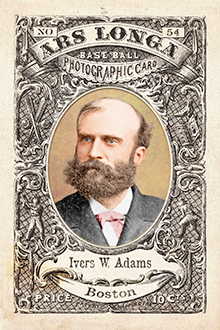
- Series: Pioneer Portraits I: 1850-1874
- City: Boston
- Team: Red Stockings (NAPBBP)
- League: National Association (NABBP)
Ivers Whitney Adams (1838-1914) was a young and ambitious visionary when he first laid eyes on Harry Wright’s new invention: professional baseball. The Cincinnati Red Stockings came to town to trounce the local Lowell lads in a June exhibition on the Boston Commons June 10, 1869. Adams was intrigued and pursued a notion for transforming Boston into a leading post-war metropolis with baseball as an engine of growth. By January 1871, the plans were laid, the Wright brothers were brought on board and the most enduring franchise in professional sports was established -- then the Boston Baseball Association, now the Atlanta Braves.
Ivers was already well on his way to wealth and fame as a patron of Boston’s industrial and social scene. His love of outdoor sports and camaraderie with his up-and-coming peers fit perfectly with the new game about to sweep America. He procured the incorporation, acquired a playing field, set the ticket prices (at Harry Wright’s urging: double the usual fee), and marketed them through George Wright’s sporting-goods emporium. Thus was baseball born in Beantown.
- Adams had vowed to friends that, if he couldn’t recruit the Wrights, he’d abandon the effort to bring the game to Boston. He only wanted the very best.
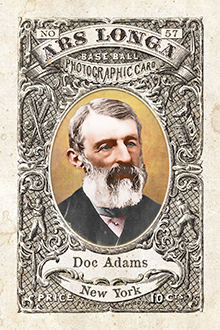
- Series: Pioneer Portraits I: 1850-1874
- City: New York
- Team: Knickerbockers
Daniel Lucius Adams (1814-1899) was playing baseball before the game was well organized or codified. He and other young doctors in New York simply found the game a great outdoor exercise. He was part of the New York Base Ball Club by 1840, five years before joining the Knickerbockers, considered by many to be the developers of the game we know today. Whatever he called it, Doc would go on to write the book on the national pastime, literally. Adams was a perennial leader among the founding fathers of the day. He advocated or arbitrated the evolving rules that came to shape the game: nine players, nine innings, ninety feet between the bases (forever to be the gold standard of human perfection). Historian John Thorn has decreed Doc as “first among the Fathers of Baseball.” The list of credentials supporting that title are too numerous to detail here. The origins of the American Game have always been curiously shrouded. The luminaries who invented the game were largely anonymous for decades. Once the Abner Doubleday myth was finally punctured, it has remained for modern historians to fill the gaps and Doc Adams has rightly assumed a prominent place in the pantheon.
- Credited with creating the shortstop position, first as a relay man when the flimsy balls made outfield throws difficult, then as a key spot in the infield defense
- In 2016, Adams' 1857 “Laws of Baseball” brought the phenomenal sum of $3.26 million at auction amid a trove of documents from that era
- Doc Adams was SABR’s Overlooked 19th Century Baseball Legend for 2014
- Doc Adams’ candidacy for election to the National Baseball Hall of Fame was finally put to vote when he appeared on the Pre-Integration Era Committee Ballot for 2016. Needing 12 of the 16 committee members’ votes for election, Doc unfortunately fell two votes short.
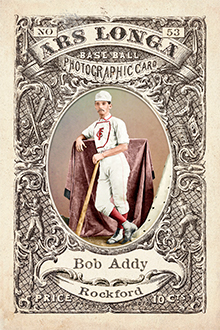
- Series: Pioneer Portraits I: 1850-1874
- City: Rockford
- Team: Forest Citys (NABBP)
- League: National Association (NABBP)
Robert Edward Addy (1845-1910) was in mid-career when he played for the Hartford Dark Blues in 1874. Having spent his early amateur and pro years with the Rockford Forest Citys, Bob was just the type of player Hartford treasured: an innovator. The hometown club of Mark Twain, the Dark Blues produced a remarkable string of “firsts” (for good and ill): 1) first team to have a captain; 2) who was also the first Jewish player in the majors—Lip Pike; 3) first to throw the curve—Candy Cummings; 4) first to bunt—Tommy Barlow; sadly, Barlow became the first big leaguer to forfeit his career to drug abuse; 5) first (and only) umpire to be expelled for throwing a game—Richard Higham, retired player. To this list was added Addy, the first to slide, a feat he piloted long before his season in CT. Not content with one “first” Bob sought years later to add “inventor of baseball on ice” to his resume, but for some reason, the idea never caught on. Ars Longa is indebted to historian David Arcidiacono for the above tidbits about Hartford's ball club. Addy was nicknamed “The Magnet” for his skill afield that helped the Boston Red Stockings to a pennant in '73. In fact, Addy was paid a superb tribute by no less than Cap Anson who, in a turn of the century book said: “Bob Addy, who was one of the best of the lot, was a good, hard hustling player, a good base runner and a hard hitter. He was as honest as the day is long . . . He was an odd sort of a genius and quit the game because he thought he could do better at something else.” Something involving bats and rinks apparently.
- Addy batted .277 for his pro career with a sole home run
- He managed parts of two seasons with the Philadelphia White Stockings and Cincinnati Reds
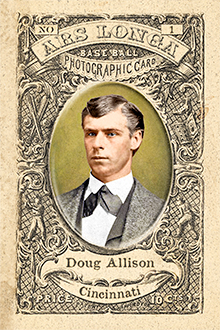
- Series: Pioneer Portraits I: 1850-1874
- City: Cincinnati
- Team: Red Stockings (NABBP)
- League: National Association (NABBP)
Douglas L. Allison (1846-1916) helped create the “Dead Ball Era” by cannily moving his catcher position closer to the plate, thus drastically reducing steals. Run production plummeted from 50-60 per game thanks in part to this savvy early player. Doug was present at the creation of professional baseball: an original Cincinnati Red Stocking in the NABBP.
- Later, Doug starred for the Washington Olympics, inaugurating the National Association (NAPBBP) in 1871
- He is credited as the 1st professional player to use a glove when he donned buckskin mittens to catch a game for the Cincinnati Red Stockings against the Washington Nationals, 6.28.1870
- Purportedly made pitchers chase down their own wild pitches
- Allison was hearing impaired. The Boston Globe reported that Allison suffered his hearing loss during his service with the Union Army during the Civil War.
- Brother Art Allison was an MLB outfielder over five seasons, 1871-1876
- Occasionally umpired games from 1872-1875
- Managed the 1873 Elizabeth Resolutes of the NA to a 2-21 record.
- Because he played in the second game in MLB history (5.5.1871), he is credited with the 17 other players that day as the 27th player to debut in MLB. (The 18 players in game #1 are all credited as the 9th player to debut in MLB).
- Died at age 70 en route to his job at the Post Office
These are reportedly Allison's hands after years of catching barehanded:
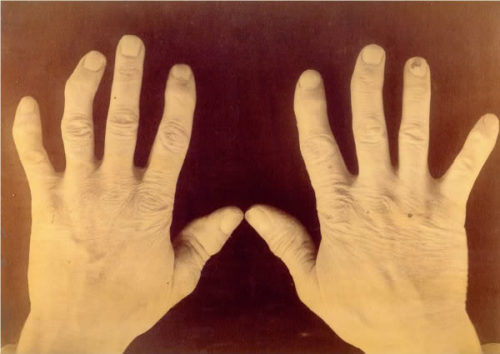
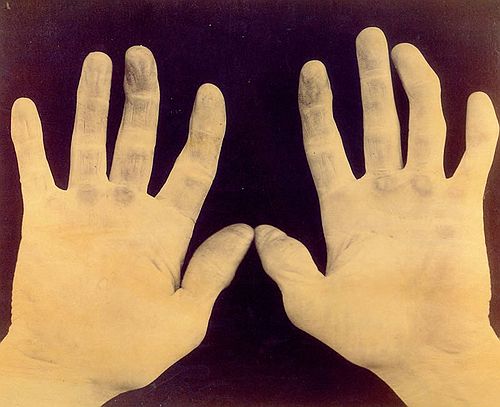
- Series: Pioneer Portraits I: 1850-1874
- City: Marshalltown
- Team: Stars (Amateur)
- League: Independent
- Hall: National Baseball Hall of Fame
Adrian Constantine Anson (1852-1922) was Mr. Longevity, a big, brawling cyclone of controversy & batsmanship unrivaled in the early days of pro ball. He set hitting standards that only the greatest future players would approach or break. He also, by dint of his ferocious personality, may have been the single greatest force for segregation in baseball until Branch Rickey began to reverse that sad estate.
- Played a record 27 consecutive years in the NL
- First batter to 3000 hits, using his powerful arms to create line drives with a short swing
- Managed the Chicago NL team to five pennants and still holds the Cub franchise records for hits, doubles, runs scored and runs batted in
- Elected to Hall of Fame: 1939






